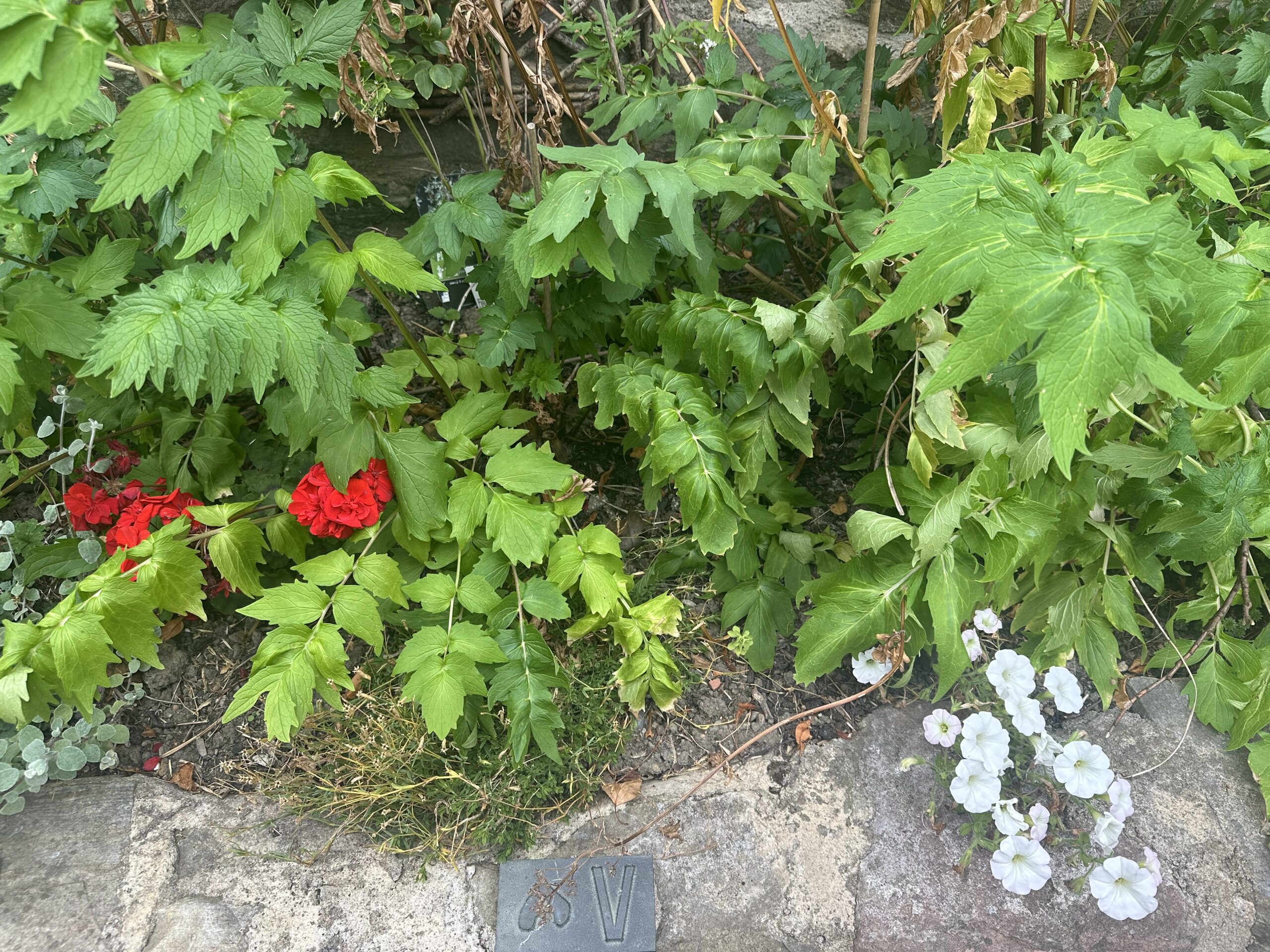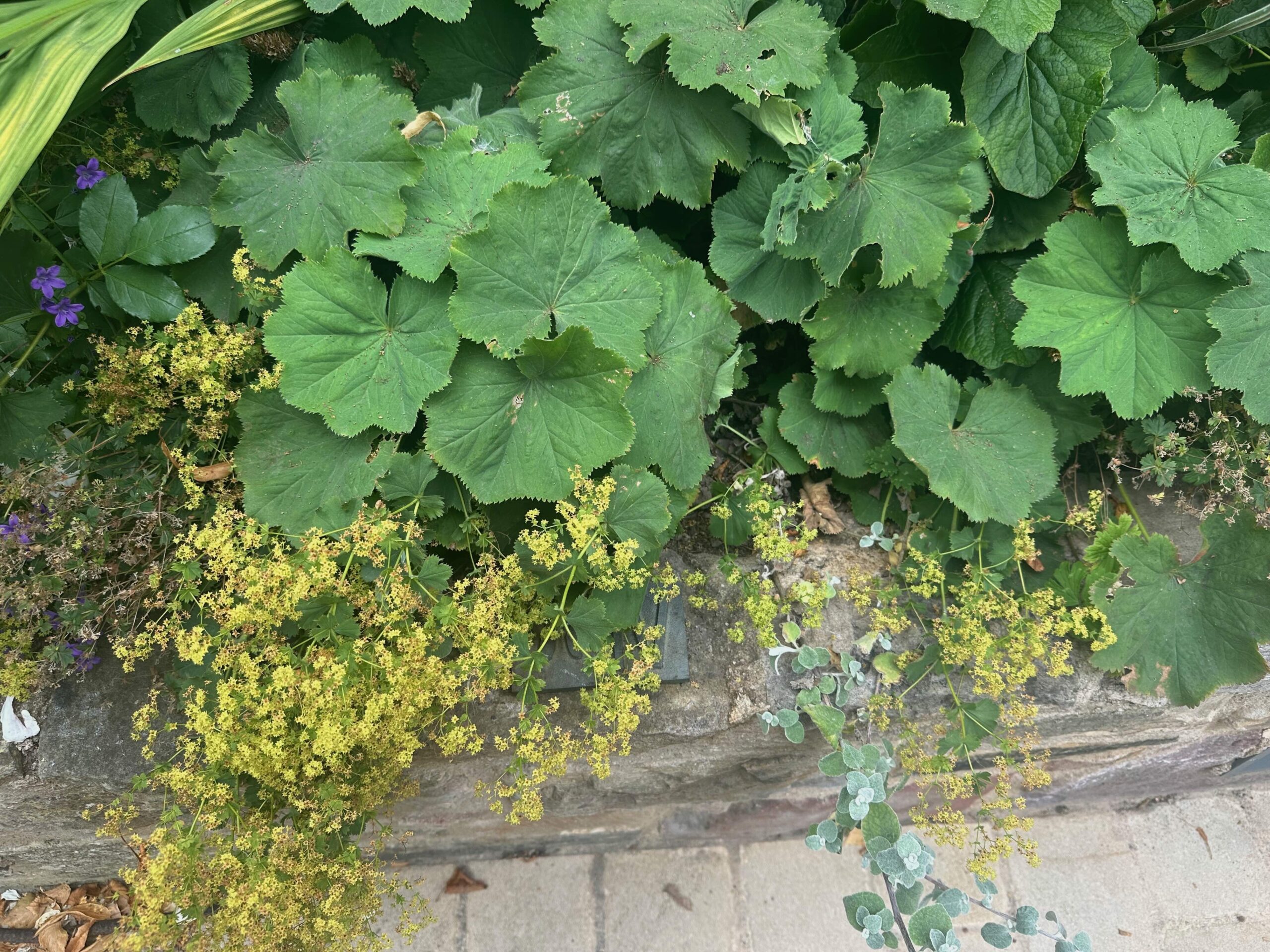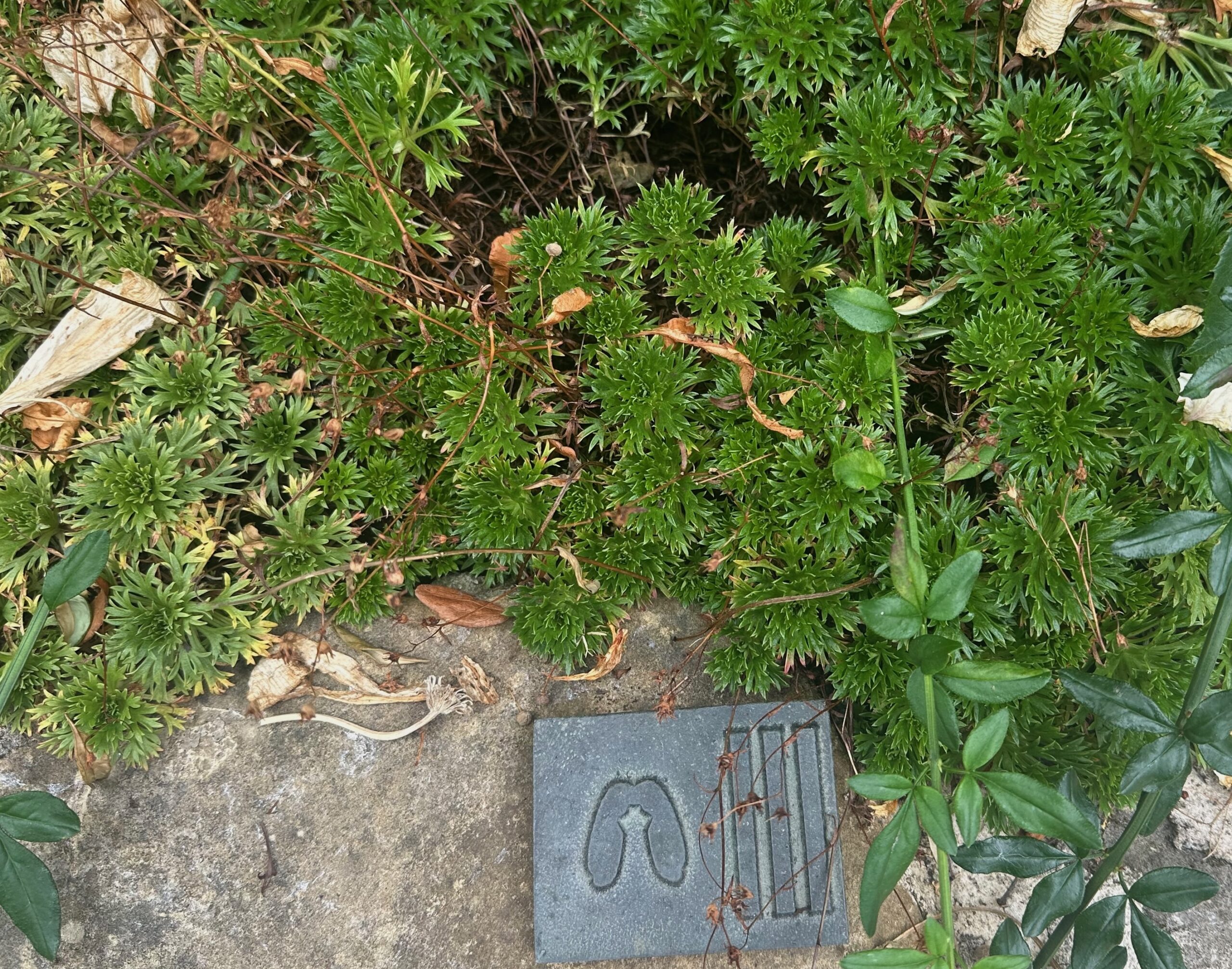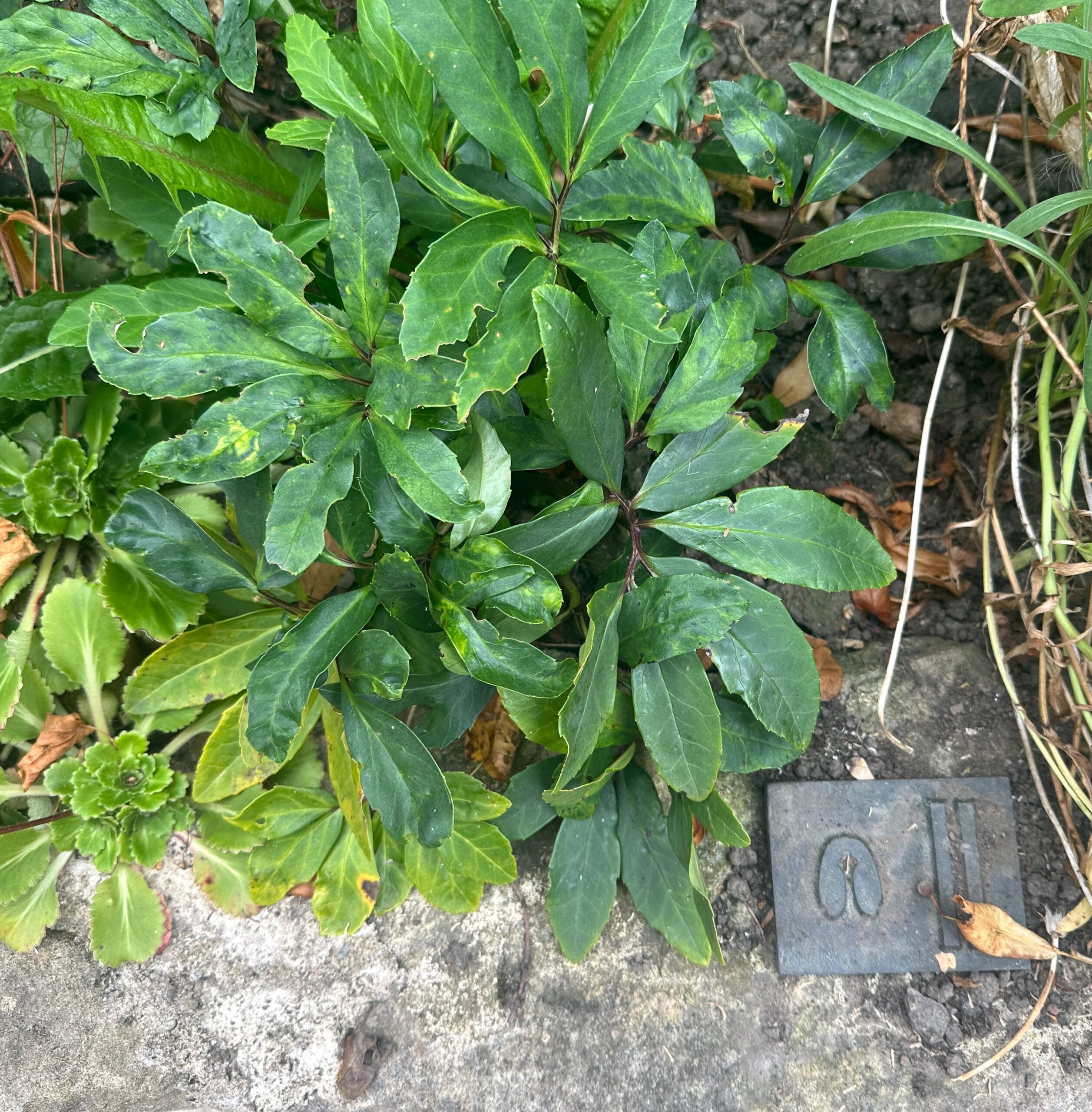
V. Simon of Cyrene helps Jesus carry the Cross.
Plant: Valerian; Valerians officinalis.
And as they led him away, they seized one Simon of Cyre’ne who was coming in from the country, and laid on him the cross, to carry it behind Jesus. Luke: 23:26
The guards pulled Simon from the crowd and forced him to pick up the back of the cross. They didn’t do that out of compassion: they were fearful that if Jesus died en route, the crowd would be denied the spectacle of Jesus’ death on a cross on the hill of Calvary. As I stand here now, I am a witness to the scene.
How do I respond when I am pressed into service to carry a cross, one I didn’t seek, one that’s inconvenient? Am I angry, bitter, reluctant, resentful? Do I continue to be angry, bitter, reluctant, resentful? The grace of quiet acceptance in the carrying of Jesus’ cross caused a change of heart in Simon. From a compulsory commission, the cross bestowed humility. The carrying of it became a privilege. I reflect on and pray for forgiveness for the times when I have been asked or forced to help someone and was filled with bitterness, rage, resentment. Going forward, may I be filled with the strength and good grace to accept with humility and gentleness the burdens that I am asked to or forced to carry. May I also be filled with the grace to accept the fact that I may never understand why I am forced to carry certain burdens. May my lack of understanding and acceptance of circumstances not be an obstacle to an opportunity to experience grace, humility and personal growth.
How ready and willing am I to offer help to those in need? Do I make time to carry the crosses of others without having to be asked, or forced? Simon saw the struggle in the face of Jesus. Do I taken any time to see suffering in the faces of strangers? Or indeed of family and friends? What do I do to help share the load?
And what about Jesus in this scene? He had nothing left. He was a broken man. He was forced to experience the hardship and humiliation of not being able to carry his burden alone. He feels the interior agony of having to accept help. He undergoes the experience of those dependant on others for survival. How do I deal with accepting help from others? Does pride and stubbornness get in the way?
MR

IV. Jesus meets His mother.
Plant: Our Lady’s Mantle; Alchemical Erythropoda & Mollis.
‘Simeon blessed them and said to Mary his mother, “Behold, this
child is set for the fall and rising of many in Israel, and for a sign
that is spoken against and a sword will pierce through your own
soul also, that thoughts out of many hearts may be revealed.’ Luke
2:34-35
The moment of encounter between Jesus and Mary is not
recorded. It is a moment of profound silence amid the violence
they are experiencing. There are no words for this type of
encounter.
This last journey is a mirror of his infancy journey, where they had
to flee a violent and bloody persecution. As refugees, the Holy
Family asks us a question in our response to the current
worldwide movement of the vulnerable and dispossessed.
All mothers journey with their child’s suffering through temporary
illness or difficulties. For some they spend a lifetime journeying
alongside their child who has a life limiting disease or condition.
To lose a child is one of the greatest sufferings.
For many mothers such loss is from death in the womb, infancy or
even late adulthood, for others it is a result of war or natural
disaster. A humanitarian aid worker tells about a mother who’s son
was kidnapped to become a child soldier. Every year, around the
boy’s birthday, the aid worker makes contact to check how she is
and let her know that they haven’t ended their search. Every night,she says, she unlocks the door of their home, in case he returns
and has lost his key. He disappeared more than 30 years ago.
But what of the mother who forgets her child? The suffering of
women due to poverty, abuse, addiction or mental illness may
leave them unable to journey with their child. Yet, God will never
forget any of his children ‘Can a woman forget her sucking child,
that she should have no compassion on the son of her womb?
Even these may forget, yet I will not forget you. Behold, I have
graven you on the palms of my hands;’ Isaiah 49:15-16.
Over the centuries Mary has been honoured with hundreds of
titles and epithets; Queen of Heaven, Throne of Wisdom, Star of
the Sea, Immaculate Conception, Theotokos (God-bearer), Queen
of Angels – but of all titles, the highest, given by Jesus himself, is
simply, Mother.
On the cross, St John describes one of the final acts of Jesus;
‘… standing by the cross of Jesus were his mother, and his
mother’s sister, Mary the wife of Clopas, and Mary Magdalene.
When Jesus saw his mother, and the disciple whom he loved
standing near, he said to his mother, “Woman, behold, your son!”
Then he said to the disciple, “Behold, your mother!” And from that
hour the disciple took her to his own home.’ John 19:26-27
JP & LP
V. Simon of Cyrene

III. Jesus falls the first time.
Plant: Partridge foot, Luetkea Pectinata
‘It is a dreadful thing to fall into the hands of the living God’ – Hebrews 10:31
Though Jesus falls to the ground seemingly losing control of his body, he is never outside the hands of His Father. We too, when we are sick, in our infirmity, sometimes can feel as though we are losing control of our bodies. We become more aware with the passing of time that we are in the hands of the living God, and it can feel dreadful, like a judgement.
Through the weakness he united to himself Jesus will shame the proud and the strong. He will show suffering is not meaningless but moves people to mercy and compassion; humility and littleness are beautiful in the sight of God. This humiliation Jesus willingly endures that we might know physical frailty does not mean we are forsaken by God. ‘Are not two sparrows sold for a penny? Yet not one of them will fall to the ground outside your Father’s care and even the very hairs of your head are all numbered. So don’t be afraid; you are worth more than many sparrows’ (Matt 10:29-31).
We might find the words of the psalm that Jesus utters on the cross on our lips when we are sick: ‘My God, My God, Why have you forsaken me?’. Our own frailty can be overwhelming. We can feel, or be made to feel, useless or unimportant. This psalm which Jesus places on his own lips, of a just man unjustly condemned to death, ends in trust that vindication will come from God. Jesus will rise again and be vindicated. We too by humility, with faith, and faithfulness through taking up our Cross and following Jesus; we will be vindicated on the day of the resurrection.
TM

II. Jesus takes up His Cross.
Plant: The Lenten Rose; Helleborus X Hybridus (Orientalis)
‘And he took with him Peter and James and John, and began to be greatly distressed and troubled. And he said to them, “My soul is very sorrowful, even to death; remain here, and watch.” And going a little farther, he fell on the ground and prayed that, if it were possible, the hour might pass from him. And he said, “Abba, Father, all things are possible to thee; remove this cup from me; yet not what I will, but what thou wilt.” Mark 14:33-36
Jesus is given the wood of the cross. This is the beginning of the events that had Jesus on his knees and pleading the night before, in the garden of Gethsemane; asking that, if possible, this should pass him by; but ultimately, ‘not my will but yours.’
Stripped, beaten, mocked, head pierced and tortured, he is then given the cold timber that will be the frame and means of his death. He chose this and embraced the cold hard consequences of his loving choice. Many suffer in similar ways, but they neither choose the violence nor welcome the injustice and torment forced on them. Christ embraces his cross in solidarity with all who suffer, and through it transforms suffering and death itself. Walking the stations of the cross provides us an opportunity to experience Jesus as the embodiment of the crucified classes of people in the world. “He was pierced for our transgressions; he was crushed for our iniquities; upon him was the chastisement that brought us peace, and with his wounds we are healed” (Isaiah 53:5).
Hidden for the most part, are individuals who make loving, self-emptying choices. I knew a girl who cared for her unwell mother and two younger siblings. Every day she would rise, feed and clothe her brother and sister and see to her mum’s medications and other needs. She would then drop her siblings off to primary school and make her way to secondary school. She was 14. In the UK 1 in 10 young people are carers. Far from being passive, their acceptance flows from a place of deeply loving generosity and wide-eyed, open-hearted choice.
Saint Francis of Assisi in his meditations of this station says firstly, Jesus willingly accepted His Cross. Second, He lovingly embraced it. Third, He tenderly kissed it. Fourth, He joyfully carried it. Like his disciples, it might be difficult for us to accept that Jesus is a Messiah who must suffer and die. But to be a disciple in the first place, Jesus made it clear that we have to go on the same journey with our own cross and choose a new life of self-emptying love.
‘Then the soldiers of the governor took Jesus into the praetorium, and they gathered the whole battalion before him. And they stripped him and put a scarlet robe upon him and plaiting a crown of thorns they put it on his head and put a reed in his right hand. And kneeling before him they mocked him, saying, “Hail, King of the Jews!” And they spat upon him and took the reed and struck him on the head. And when they had mocked him, they stripped him of the robe, and put his own clothes on him, and led him away to crucify him.’ Matthew 27:27-31
LP

I. Jesus is condemned to death.
Plants: Cap Marguerite, Pink Fuchsia, the compact Dalmation Bellflower and the Clematis Viticella Elegans on the wall. Nearby and further along the bed there is Osteospermum Ecklonis. These plants each have flowers that are all shades of purple, the colour of Lent and Christ’s Passion.
Pilate said to them, “Then what shall I do with Jesus who is called Christ?” They all said, “Let him be crucified.” And he said, “Why what evil has he done?” But they shouted all the more, “Let him be crucified.” Mathew 27:22-23.
Despite knowing of no wrong-doing, Pilate succumbed to the pressure of the loud crowd and condemned the innocent Jesus to death. I am a witness to that as I stand here now. I pause to consider and reflect on the injustice, the cruelty, the death sentence, the weakness of Pilate, the power of the loud and lousy crowd.
Painful and excruciating as it is, I pause to reflect on the times when I have hidden in the crowd, and either by shouting or by staying silent, when I have not had the strength to stand up for what is right. I acknowledge these instances here and now, with honesty and humility. I plead for mercy and forgiveness, for a clean sheet, for blamelessness. I pause to reflect on the times when I have acted as Pilate did, when I have been swayed from doing what it right to please others, to gain acceptance or to avoid discomfort, discussion, debate, argument or conflict.
Going forward in my life, at those crucial moments prior to speaking or acting, may I pause to reflect on right and wrong as I do now. May I gain the strength to do the right thing, to be a person of integrity however isolating and challenging the consequences may be. May I show compassion and kindness to those who have been wrongly accused and to those who are isolated and marginalised. May I find strength, tenacity and endurance for the times to come when I may be a victim of injustice and suffering. May I gain the confidence to take responsibility for right decisions, right actions and for myself.
MR

The Catholic Chaplaincy serves the students and staff of the University of Edinburgh, Edinburgh Napier University and Queen Margaret University.
The Catholic Chaplaincy is also a parish of the Archdiocese of St Andrews and Edinburgh (the Parish of St Albert the Great) and all Catholic students and staff are automatically members of this parish.